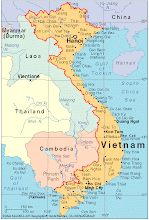Cao Bang Province is the country's northern borderland known since the era of th King An Duong Vuong (the 2nd century BC). It has a long-standing historical and cultural tradition. Its traditional history is closely linked with that of the country since the early time of national establishment and protection. The first struggle of the Au Lac people, including the Cao Bang inhabitants, led by the King against the Qin invaders won a great victory.In 180 BC, after a big battle in Cao Bang against the invasion of Trieu Da, our country was ruled by various northern feudal dynasties until 938. Through a long period against foreign rule and invasions, the people of different ethnic groups in Cao Bang and throughout the country as well created a brilliant history of construction and protection.
In the anti-French resistance for national salvation and independence, Cao Bang became an important cradle of Vietnamese revolution. Since the early 20th century, around 1925-1926, some anti-French associations of various ethnic groups headed by Hoang Dinh Giong were founded in Cao Bang.After the establishment of the Communist Party of Vietnam on 3rd February 1930, the Province's first Party cell of three members came into being on 1st April 1930; Mr. Hoang Nhu was the secretary. This event marked the development of revolutionary movement in Cao Bang.In 1933, Le Hong Phong, member of the Commission of the International Communism came to Cao Bang from where he directly guided the Party cells at home. In 1935, Hoang Van Non was selected as the official delegate of the Communist Party of Indochina to attend the Seventh International Communist Congress held in the USSR. After studying in the USSR, he came back home and became the Secretary of the Bac Ky (Tonkin) Party Committee.
At the First Plenum of the Communist Party of Indochina held in Macau (China), Hoang Dinh Giong became a member of the Central Party Committee. The revolution in Cao Bang strongly developed during the period 1936-1939.In December 1940, Nguyen Ai Quoc met Hoang Van Thu and 40 cadres of Cao Bang in Zhengxi (China) to direct the revolution enter a new stage. He decided to choose Cao Bang as the revolutionary base. He also dispatched Vu Anh, Le Quang Ba, and Hoang Sam to Ha Quang district to found the revolutionary headquarters.On 28th January 1941, Nguyen Ai Quoc crossed the milestone No 108 to enter Pac Bo village (Truong Ha commune, Ha Quang district, Cao Bang). On behalf of the people of the whole country, Cao Bang's Party cell received him right in the traditional Tet holiday after his 30-year trip to find the way for national salvation. Nguyen Ai Quoc lived and worked in Coc Bocave in very harsh conditions:
On the stone table by the Le Nin Spring, Nguyen Ai Quoc translated the History of the USSR Communist Party into Vietnamese and wrote Our Country's History in plain verse. From 10th to 19th May 1941, in Khuoi Num Hut (Pac Bo), he presided over the Eighth Plenum of the Central Party Committee, which set up many policies and lines to promote national salvation..
Under the direct leadership of Nguyen Ai Quoc, between June and August 1941, Cao Bang's Party cell dispatched 70 cadres to attend the military courses abroad. These were the first military seeds of the Cao B"ng (later Cao-Bac-Lang) Revolutionary Base and the Liberated Zone in the August 1945 Revolution.On 22 December 1944, in the Tran Hung Dao Forest (Nguyen Binh district), the Vietnamese Propaganda and Liberation Army (the predecessors of the Vietnam People's Army) was founded. At first, it consisted of 34 soldiers commanded by Vo Nguyen Giap. Its first victories over Phay Khut and Na Ngan posts started the glorious history of the Vietnam People's Army later.After the August 1945 Revolution, to implement the instructions of the Central Party Committee and President Ho Chi Minh, Cao Bang's Party cell and people of different ethnic groups made great efforts to struggle against the invasion plot of Chiang Kaishek and his henchmen, eradicate local bandits and reactionaries, strengthen the revolutionary government of all echelons, and initiate the movement of production promotion. On 16th September 1950, Cao Bang's people and army opened the Border Campaign led by Vo Nguyen Giap. President Ho Chi Minh directly came to supervise the Dong Khe Front. The 1950 Border Campaign won victory, changing the complexion of the anti-French resistance. On 3rd October 1950, Cao Bang was completely liberated.During the following decades, bringing into play the traditions of patriotism and revolutionary struggle, the Cao Bang people always remained loyal to the Party by strengthening revolutionary government, promoting manufacture, enhancing its supports to the South in the struggle for national salvation and unification and socialist construction. Cao Bang's history is always closely connected to that of the Vietnamese nation along the path chosen by our Party and President Ho Chi Minh.
From www.caobang.gov.vn

No comments:
Post a Comment